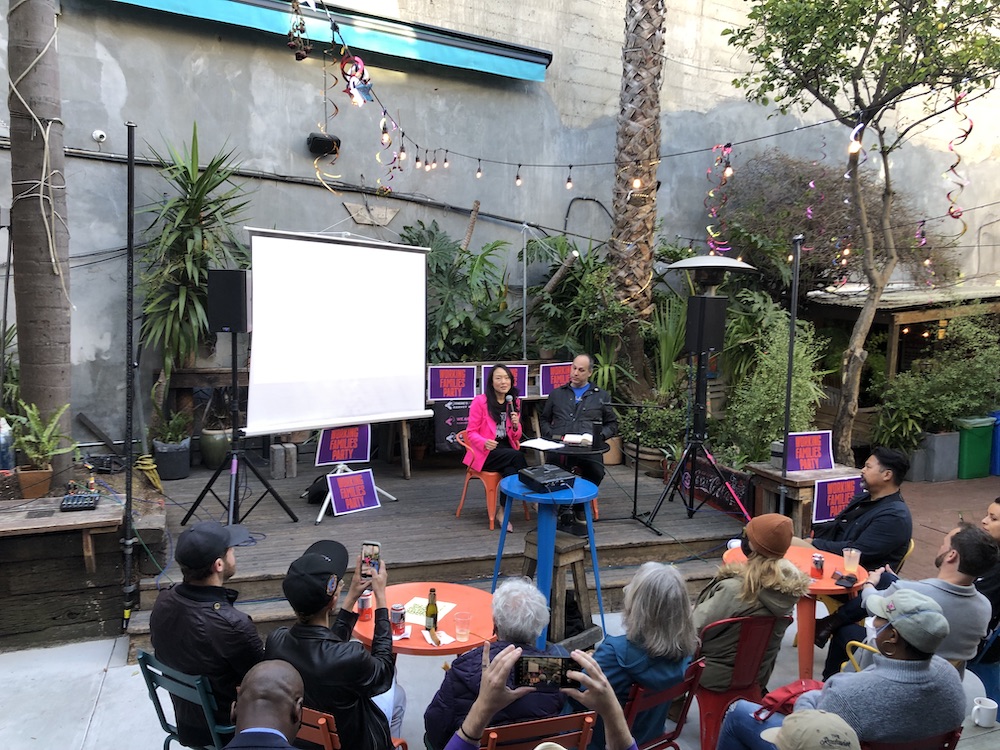I got my first glimpse of how two progressive candidates are going to run for the retiring Dianne Feinstein’s US Senate seat Thursday when the Working Families Party held the first statewide candidate forum with viewing sessions in 14 cities and more than 1,100 participants.
Reps. Barbara Lee and Katie Porter, who are seeking progressive support, both joined the discussion; Rep. Adam Schiff, who is the most centrist Democratic in the race, declined to participate.

The candidates didn’t debate; they answered questions posed by activists all over the state. That meant Porter, for example, didn’t have to talk about tax policy, and Lee didn’t get asked about immigration.
Neither candidate talked much about foreign policy, particularly the Middle East or Russia and Ukraine.
But the session was important, and illuminating, and I was glad I was there. (Joe Garofoli, the Chron’s political reporter, was on the scene at El Rio too, although I didn’t run into him. He focused on how little difference there is between the candidates. I don’t think any other local reporters covered the event.)
I walked away thinking the Lee did a better job telling the very progressive audience what specific policies she would promote, but Porter also came off as well informed with talking points that will appeal to a broad sector of the electorate.
Neither of them directly took on the most pressing issues facing our society.
Jane Kim, former San Francisco supervisor and the director of the Working Families Party of California, asked Lee the question that I think ought to dominate all of the national debate:
Economic inequality, Kim said, has risen to unprecedented levels in this country, worse than the 1920s. But that hasn’t always been the case; 50 years ago, the top tax rate on excess corporate profits was 90 percent, and the richest Americans paid as much as 95 percent of their income in taxes. And the middle class was larger and stronger than the upper class and there was less poverty (and I will add, virtually no homelessness).
She asked Lee to talk about tax policy.
Lee did well: She talked about the child tax credit, about taxes on excessive CEO pay, about the Income Equity Act, which would deny corporations tax exemptions on excessive executive pay, about the Billionaire Minimum Income Tax (which is nice, but only says that the richest people should pay no less than 20 percent) and the Estate Tax.
All good.
But she didn’t really answer the question: Should the tax rate on corporations and rich individuals go back to what it was 50 years ago, when we had a much more stable middle class?
Kim didn’t ask about a wealth tax, which Thomas Picketty, the most important economist of our era, says is the only thing that will prevent massive social unrest and instability, but Lee could also have mentioned that, and she didn’t.
Not saying Lee wouldn’t support higher taxes on the rich, but she didn’t make it a top priority.
This isn’t all that surprising: I have never, since I started covering Democratic Party politics 40 years ago, heard a candidate for statewide or federal office other than Bernie Sanders tell me that tax rates should go back to the post-War levels. I remember interviewing Al Gore when he was running for president; he told me that “taxes are high enough.” (That worked out well.) Barack Obama wouldn’t commit to higher taxes on the rich. Elizabeth Warren called for a wealth tax, but not 1960s-era income taxes. The best Kamala Harris would tell me is that “Elizabeth has some valid ideas.”
This is, of course, a fundamental problem with the Democratic Party and US politics today.
Lee did talk about cutting the $800 billion defense budget, which is kind of a no-brainer, but moving around the way the nation spends money doesn’t address economic inequality that same way taxing wealth does. She talked about Universal Basic Income, and training for the “jobs of the future;” Piketty also looked into those policies, and many others, and concluded that they won’t work to address economic inequality. The only thing that will, he argues, is taking money from the rich.
I wish someone had asked Porter the same question, but that didn’t happen. On the other hand, she had a chance to bring up economic inequality and tax policy, but didn’t.
She demonstrated instead that she is all about government oversight and regulation of big business. She talked about anti-competitive behavior by Big Pharma, which costs all of us huge amounts of money. She (like Lee) supports Medicare for All, and the Green New Deal.
She got a question about immigration policy, and carefully answered by saying that she has been to the border, has talked to people trying to enter the US, and is frustrated that “there is no process. … our failure is the failure to enforce a legal immigration process.”
She complained about criminal enterprises and private prisons.
All good points, and most California Democrats would probably agree.
She gave no specifics on what she thought a better immigration policy would look like.
She took a question about oil drilling in California and whether she would support a national ban on fracking. She talked around the issue, but never came out in support of a ban.
Neither candidate talked much about climate change, which along with economic inequality is an existential threat to humanity.
After 31 years of Dianne Feinstein, I suppose I shouldn’t set my standards all that high. But Sen. Bernie Sanders won the California primary in 2020; there’s room for a real progressive who talks about taxing the rich to reach the US Senate.
Big thanks to the Working Families Party for getting us started. I’d say both candidates have some work to do.




